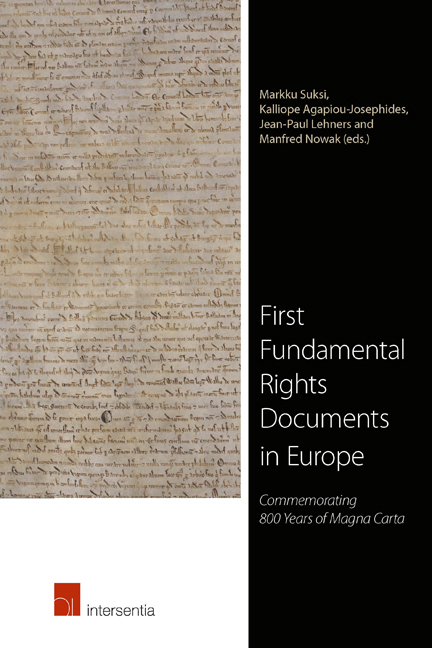Book contents
- Frontmatter
- Preface
- Contents
- List of Authors
- 1 Introduction
- PART I
- PART II
- 11 France: Foundational Importance of the Declaration of 1789
- 12 Sweden: Free Press as a First Fundamental Right
- 13 The Netherlands: The Batavian Staatsregeling as the First Fundamental Rights Document
- 14 Portugal: ‘Tropical Versailles’ in the Beginning of the Nineteenth Century
- 15 Luxembourg: Fundamental Rights in a Small State
- 16 Greece: Reflections from the Hellenic Legal Tradition
- 17 Denmark: In Love with Tradition
- 18 Germany: Fundamental Rights as an Instrument Towards the Rechtstaat
- 19 The Czech Republic: On the Road to Rights and Freedoms
- 20 Romania: The Birth of Fundamental Rights as a Form of Political Contention
- 21 Bulgaria: The Liberal Tarnovo Constitution
- 22 Finland: Rights to Facilitate Participation
- 23 Estonia: First Landmarks of Fundamental Rights
- 24 Slovakia: The Right of a Nation
- 25 Latvia: Second Part of the Constitution as a Project for Next Generations
- 26 The History of Fundamental Rights in Europe: A Long and Winding Road
- Index
21 - Bulgaria: The Liberal Tarnovo Constitution
from PART II
Published online by Cambridge University Press: 15 December 2017
- Frontmatter
- Preface
- Contents
- List of Authors
- 1 Introduction
- PART I
- PART II
- 11 France: Foundational Importance of the Declaration of 1789
- 12 Sweden: Free Press as a First Fundamental Right
- 13 The Netherlands: The Batavian Staatsregeling as the First Fundamental Rights Document
- 14 Portugal: ‘Tropical Versailles’ in the Beginning of the Nineteenth Century
- 15 Luxembourg: Fundamental Rights in a Small State
- 16 Greece: Reflections from the Hellenic Legal Tradition
- 17 Denmark: In Love with Tradition
- 18 Germany: Fundamental Rights as an Instrument Towards the Rechtstaat
- 19 The Czech Republic: On the Road to Rights and Freedoms
- 20 Romania: The Birth of Fundamental Rights as a Form of Political Contention
- 21 Bulgaria: The Liberal Tarnovo Constitution
- 22 Finland: Rights to Facilitate Participation
- 23 Estonia: First Landmarks of Fundamental Rights
- 24 Slovakia: The Right of a Nation
- 25 Latvia: Second Part of the Constitution as a Project for Next Generations
- 26 The History of Fundamental Rights in Europe: A Long and Winding Road
- Index
Summary
INTRODUCTION
The scientific and practical aim of this narrative is to review and explain the rules of the first fundamental rights document adopted in the area of Bulgaria. These will be compared with the respective norms of the Charter of Fundamental Rights of the European Union (CFREU). The intention is to identify a such historical document that shows that the fundamental rights dimension was not limited to England in the seventeenth and France in the eighteenth century but touched Bulgaria too.
It is appropriate to begin with some words about the history of Bulgaria. The country's historical heritage is related to the culture of Ancient Thrace. After the collapse of the Western Roman Empire, Bulgarian land became an integral part of the Eastern Roman (Byzantine) Empire. During the second half of the seventh century, the northeastern part of today's Bulgaria was gradually inhabited by Proto-Bulgarians or Bulgars. In alliance with the Slavonic tribes they formed the Bulgarian State on the river Danube which was recognised by the Byzantine Empire in 681 AD. The head of the new state was Khan Asparouh and the town of Pliska was the first capital. Under Khan Kroum (803–814 AD) Bulgaria bordered the Empire of Charles the Great (the Holy Roman Empire of the king Charlemagne) to the west and to the east the Eastern Roman (Byzantine) Empire. Christianity was adopted as official religion of the nation in 864 AD, the main result of which was the building of a unified Bulgarian nation.
In the late ninth century the brothers Cyril (Constantine the Philosopher) and Methodius created and began disseminating the Cyrillic alphabet. Bulgaria started developing its culture based on the new alphabet and religion. The Cyrillic alphabet was gradually spread to other Slavonic countries and as it is known today, it is used in Russia, Ukraine, Belarus, Serbia and Macedonia.
The reign of Czar Simeon I (893–927 AD) was named the ‘Golden Age of Bulgarian Culture’, and the territory of the state reached the Black Sea and the Aegean Sea. However, in 1018, after several wars, Bulgaria was conquered by the Byzantine Empire. From the very first years of Byzantine rule, the Bulgarians fought for their freedom and in 1186, an uprising led by two boyars, the brothers Assen and Peter, overthrew the Byzantines and the Bulgarian state was re-established with Turnovo as its capital.
- Type
- Chapter
- Information
- First Fundamental Rights Documents in EuropeCommemorating 800 Years of Magna Carta, pp. 267 - 276Publisher: IntersentiaPrint publication year: 2015



